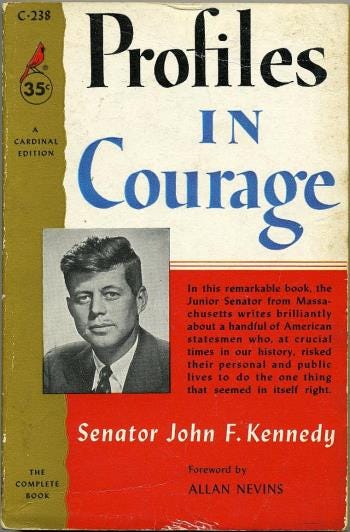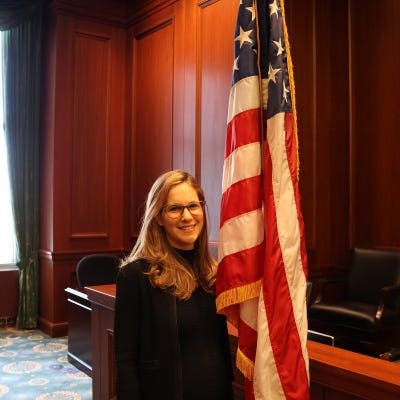Profiles in Courage: A Growing Number of U.S. Attorneys and DOJ Officials Resign
Resignation as the Last Stand Against Corruption
Christy here. As the week drew to a close, we witnessed powerful, unscripted acts of courage—modern reflections of the very profiles once celebrated by a former president.
In 1956, John F. Kennedy, then a junior U.S. Senator from Massachusetts, published Profiles in Courage, a tribute to eight U.S. senators who defied public opinion and risked their careers to stand by their principles. His message was clear: true leadership requires sacrifice, integrity, and the courage to stand alone when it matters most.
Today, in an unfortunate irony, the current administration—which includes John F. Kennedy’s nephew, Robert F. Kennedy Jr., and his brother Robert F. Kennedy Sr.’s son in a senior role—has found itself at the center of controversy for actions that contradict those ideals. The very family that once stood as a symbol of justice and integrity is now entangled in an administration accused of using the Department of Justice for political leverage.
The brazenness of these actions is striking. The Justice Department has engaged in quid pro quo deals so blatant that even career prosecutors—many with deep conservative ties—have walked away in protest, risking their careers rather than participate in what they described as the politicization of justice.
Nowhere is this clearer than in the Department of Justice and the Southern District of New York (SDNY), where a growing crisis has come to light over the past three days, marked by an unprecedented wave of high-profile resignations. These resignations were sparked by the revelation that corruption charges against New York City Mayor Eric Adams were allegedly dropped in exchange for his compliance with controversial Trump-era ICE policies. When the federal apparatus of justice becomes a bargaining chip in political deals, those who have dedicated their lives to upholding the law are faced with an impossible choice—collude or walk away. For many in the SDNY and DOJ, the answer was clear.
The Resignations: Voices of Conscience
Danielle Sassoon, the acting U.S. Attorney for the Southern District of New York, was the first to resign. Known for her unflinching dedication to the rule of law, Sassoon tendered her resignation after refusing an order from the Justice Department to drop a corruption case against Mayor Eric Adams. In her resignation letter, Sassoon described the DOJ’s actions as a “classic stick-and-carrot strategy” aimed at coercing Adams into adopting harsher immigration enforcement policies in exchange for leniency in his corruption investigation.
Her departure was quickly followed by the resignation of Hagan Scotten, an assistant U.S. attorney at SDNY. In his own resignation letter, Scotten agreed with Sassoon’s assessment and called attention to the DOJ’s insistence that the case be dismissed “without prejudice,” a highly unusual move designed to leave the door open for the charges to be refiled later—perhaps as leverage if Adams fell out of favor with federal officials.
Following Sassoon and Scotten, five additional senior prosecutors from SDNY and the DOJ’s Public Integrity Section also resigned, making this one of the largest and most coordinated resignations in the department’s history. This unprecedented wave of resignations draws immediate comparisons to the infamous “Saturday Night Massacre” during the Nixon administration, when senior Justice Department officials resigned rather than comply with unconstitutional directives, immediately evokes memories ofating the Watergate scandal.
Clear Evidence of Quid Pro Quo
The denials of quid pro quo from DOJ leadership, including acting Deputy Attorney General Emil Bove, have been anything but convincing. Bove’s internal communication regarding the dismissal included a lengthy footnote explicitly refuting allegations of political interference, which many have interpreted as an overly defensive—and ultimately telling—gesture. His repeated insistence that there was “no coordination” between the DOJ and Mayor Adams on immigration policy has only deepened suspicion.
Adding further weight to the accusations, Sassoon’s resignation letter outlined clear instances of coercion, referring to “the stick-and-carrot strategy” the DOJ had deployed. The “stick” was the corruption charges hanging over Adams’ head, while the “carrot” was the promise of their dismissal if he complied with federal immigration enforcement policies.
This approach, Sassoon noted, had no precedent in the DOJ, despite Bove’s justification that the dismissal was necessary to “avoid election interference” in a mayoral campaign. Sassoon dismissed this approach as both baseless and historically inaccurate. As Sassoon pointed out, there is no established DOJ policy dictating that corruption charges should be dismissed in cases involving municipal elections.
A Crisis Behind Closed Doors at DOJ
The crisis reached its boiling point when a group of DOJ attorneys was confined to a room and presented with a grim ultimatum: either one of them would agree to drop the charges against Mayor Adams, or they would all be fired on the spot. The pressure was intense, and the attorneys were left facing an impossible dilemma—sacrifice their principles to preserve their positions and maintain some degree of control within the institution, or resist and risk being replaced by political loyalists.
In the end, a senior official reluctantly agreed to dismiss the charges—not as an endorsement of the directive but as a strategic move to protect the office from complete capture. The calculation was grim but pragmatic: maintaining a foothold within the DOJ was better than allowing the office to be completely overtaken by those with no regard for its independence. This official’s resignation came shortly after, leaving little doubt about his true feelings on the matter.
The Awkward Fox & Friends Appearance
If any doubt remained about the pressure being applied, it was quickly dispelled during an awkward joint appearance on Fox & Friends with Mayor Eric Adams and Tom Homan, the former acting director of ICE and now the current Border Czar. The segment was ostensibly designed to refute claims of a quid pro quo, but it ended up revealing far more than intended.
While Mayor Adams dismissed the allegations as “silliness” and flatly denied any deal, Homan took a much different approach. His tone was aggressive and unmistakably threatening. Homan warned that if Adams didn’t comply with federal immigration directives, he would be “back in New York and up Adams’ butt.”
The juxtaposition was startling. Adams, attempting to maintain a diplomatic front, looked visibly uncomfortable as Homan essentially confirmed the very coercion Adams had just denied. The segment raised more questions than it answered and only served to deepen suspicions that political pressure, not legal merit, had driven the dismissal of the charges.
Pam Bondi’s Role and the Breaking Point
Central to this unraveling is Attorney General Pam Bondi, who reportedly supported Bove’s directive to dismiss the charges. Bondi, a polarizing figure with deep ties to President Trump’s inner circle, has been accused of prioritizing political considerations over the impartial administration of justice. Her involvement has fueled outrage among career prosecutors and legal observers, who see the move as a dangerous precedent that undermines the rule of law.
A Tradition of Resigning to Avert Disaster
History is filled with examples of principled resignations in the face of political interference. The “Saturday Night Massacre” of 1973 stands as a stark reminder of the critical role individual integrity plays in upholding democratic institutions. Similarly, these recent resignations are a declaration of independence, a refusal to comply, and an urgent call for the public to pay attention.
What Happens Next?
The consequences of these resignations are already being felt. The SDNY, long considered the crown jewel of federal prosecutors’ offices, is in turmoil. Morale has plummeted, and trust in leadership is at an all-time low.
But the resignations of Sassoon, Scotten, and their colleagues are not the end of this story. They are the beginning.
John F. Kennedy’s Profiles in Courage chronicled acts of bravery and principle during some of the most difficult moments in American history. The lessons of that book—about standing firm in the face of political pressure, about placing justice above personal ambition—are more important now than ever. Acts of courage like those displayed by Sassoon and her colleagues inspire others to step forward. Courage is contagious, and every act of integrity encourages another.
In his inaugural address, which came five years after publishing Profiles in Courage, John F. Kennedy urged Americans to “ask not what your country can do for you—ask what you can do for your country.” These words resonate deeply today as public servants are called to make personal sacrifices in defense of democracy.
In moments like this, as more and more government officials face impossible decisions, the courage to dissent remains one of the few bulwarks left against the current administration’s clear mission: to dismantle 250 years of democratic institutionalism in America. The strength of our republic rests on those willing to take that stand.






